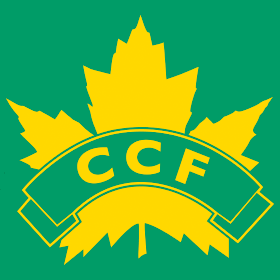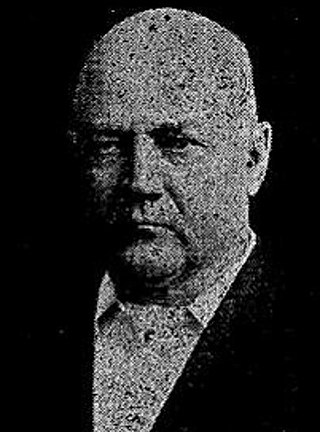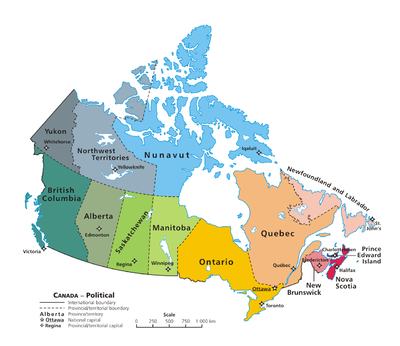
The Co-operative Commonwealth Federation was a federal democratic socialist and social-democratic political party in Canada. The CCF was founded in 1932 in Calgary, Alberta, by a number of socialist, agrarian, co-operative, and labour groups, and the League for Social Reconstruction. In 1944, the CCF formed one of the first social-democratic governments in North America when it was elected to form the provincial government in Saskatchewan.
The Progressive Party of Canada, formally the National Progressive Party, was a federal-level political party in Canada in the 1920s until 1930. It was linked with the provincial United Farmers parties in several provinces, and it spawned the Progressive Party of Saskatchewan, and the Progressive Party of Manitoba, which formed the government of that province. The Progressive Party was part of the farmers' political movement that included federal and provincial Progressive and United Farmers' parties.
There have been various groups in Canada that have nominated candidates under the label Labour Party or Independent Labour Party, or other variations from the 1870s until the 1960s. These were usually local or provincial groups using the Labour Party or Independent Labour Party name, backed by local labour councils made up of many union locals in a particular city, or individual trade unions. There was an attempt to create a national Canadian Labour Party in the late 1910s and in the 1920s, but these were only partly successful.

The Socialist Party of Canada (SPC) was a political party that existed from 1904 to 1925, led by E. T. Kingsley. It published the newspaper, Western Clarion.
The Social Democratic Party was a social democratic political party in Canada founded in 1911 by members of the right wing of the Socialist Party of Canada, many of whom had left the organisation in May 1907 to form the Social Democratic Party of British Columbia. These members were dissatisfied with what they saw as that party's rigid, doctrinaire approach. As opposed to the Socialist Party of Canada, the SDP allowed minority language groups ample room for self-determination, which led to a perception that the ethnic groups were more dominant than the overarching SDP. When the authorities cracked down on ethnic groups during the 1918 wave of repression, many of the individual ethnic chapters were shut down.
The Socialist Party of Manitoba (SPM) was a short-lived social democratic political party launched in 1902 in the Canadian province of Manitoba. The organisation advanced a moderate programme of social reform legislation. In 1904 the SPM became one of the constituent units founding the Socialist Party of Canada, an organisation which continued until 1925.

George Armstrong was a politician and labour activist in Manitoba, Canada. He served in the Legislative Assembly of Manitoba from 1920 to 1922, and is notable as the only member of the Socialist Party of Canada ever to serve in that institution.
The Socialist Party of British Columbia (SPBC) was a provincial political party in British Columbia, Canada, from 1901 to 1905. In 1903, the SPBC won seats in the Legislative Assembly of British Columbia.

Socialism in Canada has a long history and along with conservatism and liberalism is a political force in Canada.
The World Socialist Party of Canada (WSPC) was a political party active in the 1960s. It was formed by members who broke away from the Socialist Party of Canada in Vancouver over becoming members-at-large and the Ahrens-Cannon controversy. The WSPC was more active propagating socialism than the SPC's three official locals. For a few months, it probably had slightly more members than SPC. On 15 March 1970, the GEC passed a resolution "that the WSPC be informed it is unacceptable they join the SPC as anything other than new members". The resolution continued, that the applicant no longer belongs to the WSPC, or that the WSPC no longer exists. It was the beginning of the end for the World Socialist Party of Canada.

The One Big Union (OBU) was a militant left-wing industrial union based primarily in Western Canada. Launched formally in Calgary on June 4, 1919, the OBU, after a spectacular initial upsurge, lost most of its members within a few years. It eventually merged with the Canadian Labour Congress in 1956.
The Socialist Party of Ontario is the name of two minor political parties in provincial history that advocated socialism. The first iteration of the party, which existed from 1903 to 1925, was initially affiliated with the Canadian Socialist League and, after 1905, with the Socialist Party of Canada. The second iteration existed from 2011 to 2016 and was created by disaffected members of the New Democratic Party.

E.T. Kingsley was a founder and leader of the Socialist Party of Canada (SPC) and editor of Western Clarion, the SPC's official publication in early twentieth-century Canada.
The Canadian Socialist League (CSL) was the first nationwide socialist organization founded in Canada. It originated in Montreal in 1898, but was strongest in Ontario and British Columbia. The leaders espoused a moderate socialism based on Christian reform principles. Members of the league formed provincial socialist parties. In 1905 these parties merged into the Socialist Party of Canada (SPC).
The Socialist Party of Canada (SPC) is a socialist political party in Canada, affiliated with the World Socialist Movement.

The Socialist Labour Party was a socialist political party in the United Kingdom. It was established in 1903 as a splinter from the Social Democratic Federation (SDF) by James Connolly, Neil Maclean and SDF members impressed with the politics of the American socialist Daniel De Leon, a Marxist theoretician and leading figure of the Socialist Labor Party of America. After decades of existence as a tiny organisation, the group was finally disbanded in 1980.
The Social Democratic Party of British Columbia (SDPBC) was a social democratic organisation established in May 1907 by defecting members of the impossibilist Socialist Party of Canada. Headed by pioneer Canadian socialist Ernest Burns, the SDPBC was a key constituent group behind the formation of the Social Democratic Party of Canada in 1911.

William Arthur (Bill) Pritchard was a Canadian Marxist labour activist, organizer, editor, journalist, and politician. A major figure in the One Big Union movement, he also was one of the defendants in the 1920 sedition trial of leaders of the 1919 Winnipeg General Strike. Pritchard later was elected reeve (mayor) of Burnaby, British Columbia during the Great Depression and played an instrumental role in founding the BC Co-operative Commonwealth Federation.

Richard Parmater (Parm) Pettipiece was a Canadian socialist and publisher. He was one of the founders of Socialist Party of Canada, and one of the leaders of the Canadian socialist movement in British Columbia in the early 20th century. Later he moved into the moderate trade union movement, and for many years was a Vancouver alderman.
George Weston Wrigley (1847–1907) was a Canadian journalist and social reformer. He was a believer in the Social Gospel and was an opponent of industrial capitalism, which he blamed for many social ills. He was the editor of several newspapers that promoted reform in the later part of the 19th century.










